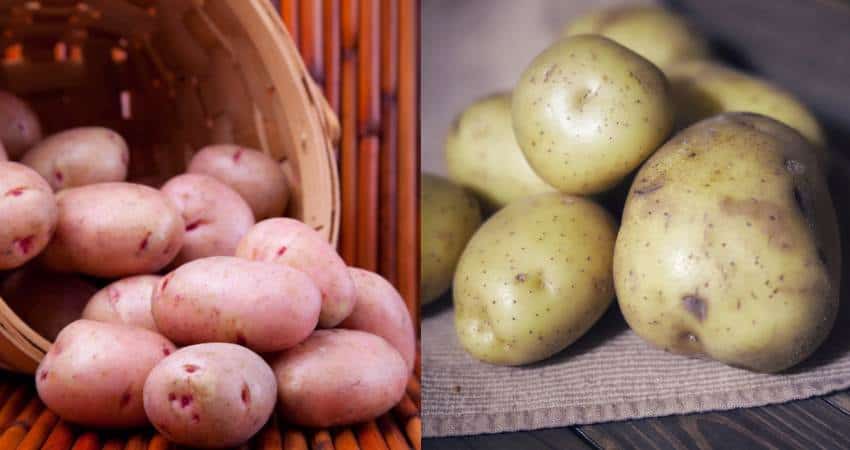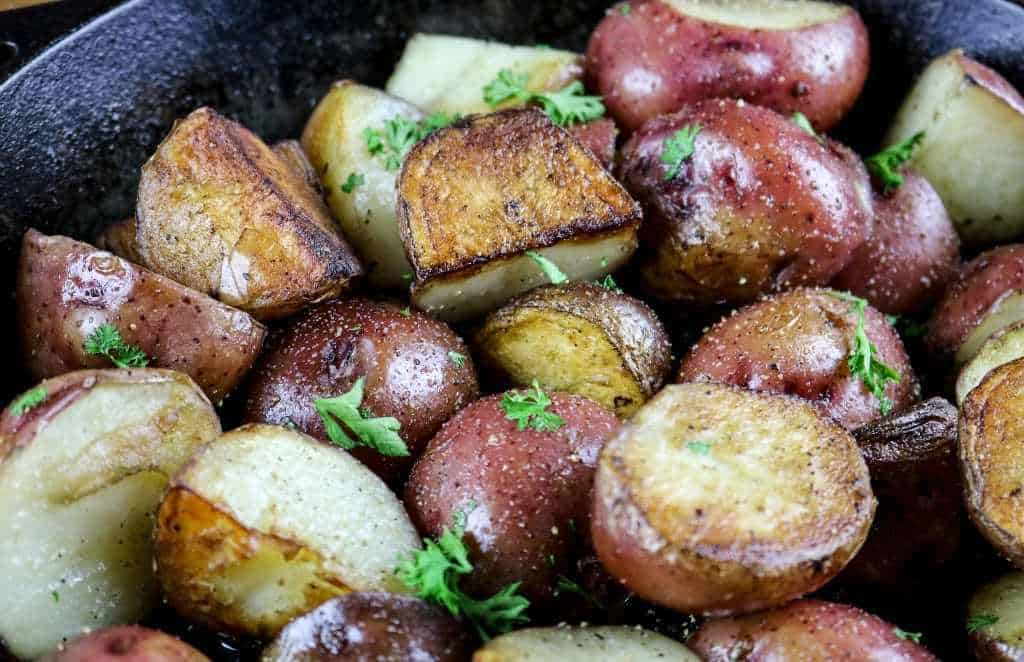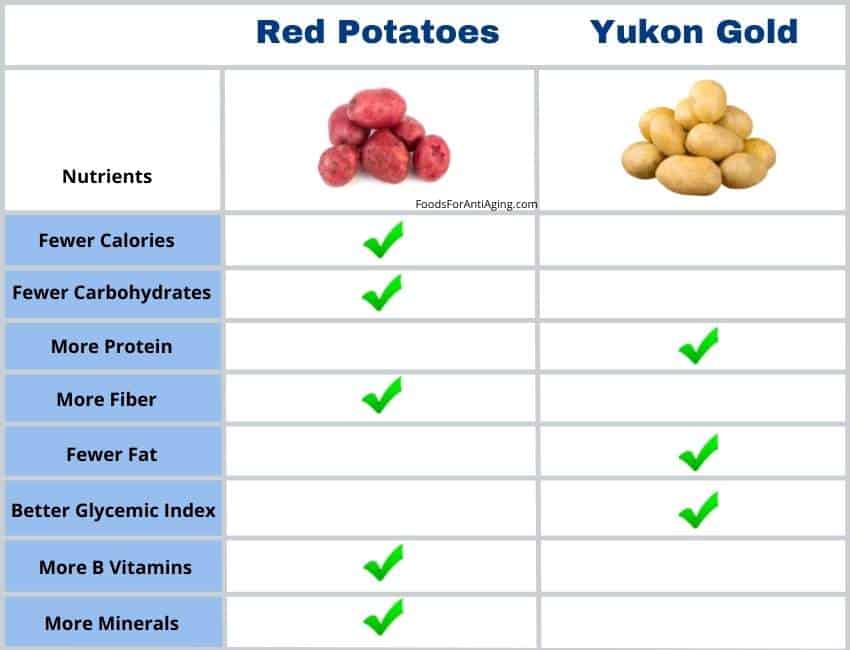Red Potatoes vs Yukon Gold Potatoes: The Potato Differences
As a Certified Health Coach, many people ask me about red potatoes and Yukon Gold potatoes which are two of the most popular varieties. Since they’re similar in some ways many people wonder about their differences. Therefore, what’s the difference between red potatoes and Yukon Gold potatoes?
Red potatoes have a red colored skin with a white flesh. Yukon Gold potatoes have a light tan to yellow colored skin with a yellowish flesh. Red potatoes are waxier than the creamier Yukon Gold. Red potatoes contain more fiber and potassium while Yukon Gold has more vitamin C.
This article will examine their tastes, textures, costs, whether one can substitute for the other and the best type of recipe for each potato. In addition, I’ll do a side-by-side comparison of their nutrients.
Red Potatoes and Yukon Gold: Differences
| Red Potato | Yukon Gold | |
| Skin color | Red | Light tan to yellow |
| Flesh | White | Yellowish |
| Texture | Waxier | Creamier |
| Taste | Mild, buttery & unsweet | Mild, buttery & unsweet |
| Cooking times | Similar | Similar |
| Price | Similar/$0.99 lb. | Similar/$0.99 lb. |
| Glycemic Index | Higher | Lower |
| B vitamins | More | Less |
| Minerals | More | Less |

Red Potato vs Yukon Gold Potato: Nutritional Content
You may have heard most potatoes are similar in the percentage of nutrients they provide. This may be true to a certain extent. There are some similarities and differences. Therefore, let’s take a look at the nutrients contained in each one.
The following table is a side-by-side comparison of the nutrients:
| Red Potato Raw (100 g) | Yukon Gold Potato Raw (100 g) | |
| Calories | 70 | 74 |
| Protein | 1.89 g | 2.03 g |
| Carbohydrates | 15.9 g | 17.5 g |
| Fiber | 1.7 g | 1.4 g |
| Fat | 0.14 g | 0.05 g |
| Sugar | 1.29 g | 0.68 g |
| Vitamin A | 0 IU | 0 IU |
| Beta-carotene | 0 mcg | 0 mcg |
| Vitamin C | 8.6 mg | 18.2 mg |
| Vitamin B6 | 0.17 mg | 0.13 mg |
| Vitamin B9 (Folate) | 18 mcg | 11 mcg |
| Vitamin B1 (Thiamin) | 0.08 mg | 0.07 mg |
| Vitamin B2 (Riboflavin) | 0.03 mg | 0.02 mg |
| Vitamin B3 (Niacin) | 1.15 mg | 1.08 mg |
| Vitamin B5 (Pantothenic Acid) | 0.3 mg | 0.3 mg |
| Magnesium | 22 mg | 16 mg |
| Phosphorous | 61 mg | 41 mg |
| Potassium | 455 mg | 419 mg |
| Iron | 0.73 mg | 0.73 mg |
| Copper | 0.13 mg | 0.05 mg |
| Calcium | 10 mg | 14 mg |
| Zinc | 0.3 mg | 0.2 mg |
Nutrient Resources ((USDA: Potatoes, red, flesh and skin, raw))12
At first glance it’s difficult to determine which one contains a higher percentage than the other. Let’s take a close look at which one is healthier.
Red potatoes are healthier than Yukon Gold due to their higher percentage of fiber, B vitamins and minerals. They contain more B6, folate, thiamin, riboflavin, niacin, magnesium, potassium, phosphorus, copper and zinc. They have fewer carbohydrates and calories.
Yukon Gold potatoes contain more protein, vitamin C and calcium. Both contain similar numbers of B5 and iron.
From a nutrient and health benefit point of view, you can’t go wrong choosing either one to include in your next meal.
I mostly eat sweet potatoes but when they’re unavailable, I choose red as my next choice due to its nutrients.
To find out how each one of these nutrients benefit health, take a look at the health benefits section down further in the article.
Red and Yellow: Taste and Texture
Due to a different skin color, it’s easy to think they don’t taste the same. Let’s examine the taste and texture of both.
Red and Yukon Gold potatoes have a mild, buttery and unsweet flavor. They are less starchy and have a thinner skin than russet. Red are waxier than the creamier Yukon Gold potato.
I wanted to get the opinion of real people like you by conducting some original research. So I reached out to some members of food groups, my clients and readers. I asked, what tastes better?
- 56% said they preferred the taste of red.
- 32% said they preferred the taste of Yukon Gold.
- 12% said it didn’t matter.
I also participated in my own blind taste test. I had each potato cut up into the same size pieces and roasted in a pan with avocado oil and seasonings. I picked and preferred the taste of the red potatoes.
The following video compares Yukon Gold, red potatoes and others.
Substitutions
Sometimes the potato you wanted to buy wasn’t available in the supermarket. Other times you want to follow a recipe, and you only have one kind of potato at home and don’t want to run out to the store.
In these situations you’ll wonder if you can substitute one for the other. Let’s explore the different situations.
Yukon Gold potatoes can substitute for red potatoes due to their similar buttery, mild flavor. They can replace red when baking, roasting, mashing, scalloping, stewing or using in soups.
Red Potato for Mashed Potatoes
Red can substitute for Yukon Gold potatoes due to their similar mild, buttery flavor. They can be used when stewing, in soups, baking, roasting, scalloping and mashing. Both varieties have the same boiling times.
Waxy Texture for Soups
Red potatoes can substitute for Gold in soups due to their waxy texture. They hold their shape together making them good for soups, stews and potato salads.
Both are versatile and can substitute for each other in most cooking methods.
Potato Salad
Red potatoes are good for potato salad and the following:
- Soups containing potatoes
- Stews
- Curry
- Mashed potatoes
- Crispy roasted potatoes
- Scalloped potatoes
Yukon Gold potatoes are good for the following:
- Soups containing potatoes
- Mashed potatoes
- Baked potatoes
- Crispy roasted potatoes
- Scalloped potatoes
Find out how Russet compared to red in my article.
Cooking Times
Red potatoes and Yukon Gold potatoes have similar cooking times. Boiling times for small is 15 minutes and 20-25 minutes for a regular size.
There are a few things you should consider before substituting these potatoes with each other.
- Consider the size of the potato to determine cooking times. Increased cooking times is recommended when substituting larger potatoes for smaller ones.
- If you’re substituting smaller with smaller sizes, remember shortening the cooking time.
- The weight quantity of each one called for doesn’t change when substituting one for the other.
Prices
With the rising prices of everything lately, the cost when shopping may be a consideration. The price may sway your decision about which one to use. Therefore, let’s examine which costs more.
Yukon Gold and red potatoes have a similar price. Both potatoes average cost is $0.99 per pound for regular size, loose potatoes.
To conduct my own research, I checked three different supermarkets located in my area. All three supermarkets are on different levels of pricing. Walmart is the most economical and Stop & Shop being the most expensive.
I visited the Shoprite supermarket first for the prices:
- Red potatoes
- $0.99 per pound
- Yukon Gold potatoes
- $0.96 per pound
I then checked Walmart:
- Red potatoes
- $0.98 per pound
Lastly, I checked Stop & Shop:
- Red potatoes
- $0.99 per pound
- Yukon Gold potatoes
- $0.99 per pound
Find out how the nutritional values of rice compared in my article, Potato vs. Rice Nutrition: Which is Better?
Storage
Whichever one you choose or have on hand, properly storing them is important. How you store food can affect the quality and how long they last before going bad.
Store Yukon Gold or red potatoes in a dark place away from heat. Do not store either one in the refrigerator. A humid basement or root cellar is the best area. They should be kept in a burlap bag or ventilated container and stored between 40°F and 60°F.
Storing either one in a refrigerator can make the center of them hard and change the cell structure. This can diminish the flavor of the potato. If you don’t have a cool basement, be sure to store them in a ventilated place, away from heat and light.
Don’t wash them before storing them. The moisture will promote the growth of bacteria and fungus3.
Humid storage locations are best because they are 80% water and can dry out if stored in a drier place. Commercial storage facilities are set at 90 to 95% relative humidity.
If you’re interested about how sweet potatoes held up against pumpkin for health and nutrition, check out my article, Pumpkin vs Sweet Potato: A Complete Comparison.

Find out if these two yellow ones, Idaho and Russet, are really the same in my article, Idaho vs Russet Potatoes – Are They The Same? Let’s Compare.
Glycemic Index
The Glycemic Index (GI) is a scale measuring how fast a particular food raises the blood sugar in the blood4. Blood sugar spikes can lead to health complications with the kidneys, nerves, heart and eyes5.
Foods on the GI scale are categorized as:
- Low-GI foods: 55 or under
- Medium-GI foods: 56-69
- High-GI foods: 70 or over
How blood sugars levels are affected:
- Foods with a glycemic index 70 or more cause a quicker spike in blood sugar levels.
- Foods with a glycemic index 56 to 69 cause a moderate spike in blood sugar levels.
- Foods with a glycemic index 55 or less cause a slow spike in blood sugar levels.
Now we know what GI is, and how it affects blood sugar, let’s take a close look at which one has a higher GI.
Yukon Gold potatoes have a lower GI than red potatoes depending on the cooking method used. A boiled Yukon Gold potato has a GI of 58, and a boiled red potato has a GI of 89.
Not every white potato has an equal GI. Yukon Gold and other white/red potatoes all have different GI scores. In addition to how one is cooked, the heat of the food when eaten affects the GI.
A study published in the Journal of the Diabetic Association found boiled potatoes eaten cold had a GI score of 56. When eaten hot the boiled potato had a GI score of 896.
Find out how white sweet potatoes compared in my article, White Sweet Potato vs. Sweet Potato: What’s The Difference?

Health Benefits
Both potatoes contain similar nutrients and numbers of each. For this reason, they provide similar health benefits. The nutrients they are known for are listed below and how they may benefit health.
Potassium
Red potatoes provide 455 mg. Potassium helps the body get rid of excess sodium reducing fluid build-up. These help keep systolic and diastolic blood pressure lower ((American Heart Association: How Potassium Can Help Control High Blood Pressure)).
According to Harvard Health, a number of studies have shown a connection between low potassium levels and high blood pressure7. The more potassium, the more sodium your body will lose.
Consuming too much sodium or not enough potassium throws off the delicate balance the kidneys need to remove the excess water8.
Find out how cassava compared to potatoes in my article, Cassava vs. Potato: Are They The Same? Let’s Compare.
Vitamin C
Yukon Gold potatoes contain 18.2 mg of vitamin C per 100 grams. Vitamin C acts as an antioxidant and helps with the following:
- Help maintain health gums.
- Collagen production.
- Prevent cell damage.
- May help boost the immune system.
- Increases iron absorption.
- Help heal wounds.
Fiber for Gut Health and Digestion
They both contain fiber. Fiber remains in the digestive tract and provides gut related health benefits. Fiber rich diets have been linked to regular bowel movements and a lower risk of colon cancer9.
B Vitamins
The B vitamins provided by both include the following:
- B1 (thiamin)
- B2 (riboflavin)
- B3 (niacin)
- B5
- B6
- B9 (folate)
- B12
B vitamins help support the following:
- Brain function.
- Nerve function.
- Red blood cells.
- Cardiovascular disease.
- Digestion.
- Energy levels.
Find out how taro compared in my article, Taro vs. Potato – A Complete Comparison.
A lack of B vitamins has been associated with oxidative stress and neural inflammation. In a study released in 2018 32 healthy adults were given B vitamin supplementation for six months. The results indicated preliminary evidence B vitamin supplementation reduced oxidative stress and inflammation10.
The yellow potato is a better source of iron and calcium.
The following video shows both potatoes harvested in the garden.
If you have any questions about this article don’t hesitate to email us. You can find an email on our contact page.
Read Next – More Potato vs Food Articles!
Sweet Potato vs. Butternut Squash: A Comparison
Purple Sweet Potato vs Sweet Potato: What’s The Difference?
Are Sweet Potatoes Healthier Than Regular Potatoes?
Sweet Potato vs. Russet Potato: What’s The Difference?
Yukon Gold Potato vs Russet Potato: What’s The Difference?
- USDA: Yukon Gold Potatoes, Yukon Gold [↩]
- USDA: Brookshire’s, Yukon Gold Potatoes [↩]
- University of Idaho: Options for Storing Potatoes at Home [↩]
- Harvard Health Publishing: Glycemic index for 60+ foods [↩]
- National Institute of Diabetes and Digestive and Kidney Diseases: Know Your Blood Sugar Numbers: Use Them to Manage Your Diabetes [↩]
- National Center for Biotechnology Information: Glycemic index of potatoes commonly consumed in North America [↩]
- Harvard Health: Potassium lowers blood pressure [↩]
- National Center for Biotechnology Information: The Effect of the Sodium to Potassium Ratio on Hypertension Prevalence: A Propensity Score Matching Approach [↩]
- National Center for Biotechnology Information: Mechanisms linking dietary fiber, gut microbiota and colon cancer prevention [↩]
- National Center for Biotechnology Information: The Effect of a High-Dose Vitamin B Multivitamin Supplement on the Relationship between Brain Metabolism and Blood Biomarkers of Oxidative Stress: A Randomized Control Trial [↩]
